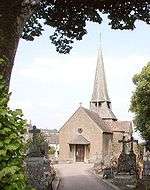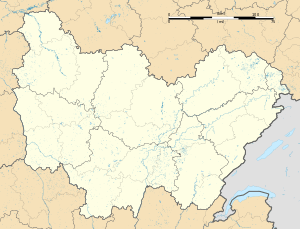Saulieu
Saulieu is a commune in the Côte-d'Or department in the Bourgogne-Franche-Comté region in eastern France.

Saulieu | |
|---|---|
 Saint-Andoche basilica | |
.svg.png) Coat of arms | |
Location of Saulieu 
| |
 Saulieu  Saulieu | |
| Coordinates: 47°16′51″N 4°13′46″E | |
| Country | France |
| Region | Bourgogne-Franche-Comté |
| Department | Côte-d'Or |
| Arrondissement | Montbard |
| Canton | Semur-en-Auxois |
| Government | |
| • Mayor (2008–2014) | Anne-Catherine Loisier |
| Area 1 | 32.03 km2 (12.37 sq mi) |
| Population (2017-01-01)[1] | 2,413 |
| • Density | 75/km2 (200/sq mi) |
| Time zone | UTC+01:00 (CET) |
| • Summer (DST) | UTC+02:00 (CEST) |
| INSEE/Postal code | 21584 /21210 |
| Elevation | 394–596 m (1,293–1,955 ft) (avg. 545 m or 1,788 ft) |
| 1 French Land Register data, which excludes lakes, ponds, glaciers > 1 km2 (0.386 sq mi or 247 acres) and river estuaries. | |
Capital of the Morvan, situated within the Morvan Regional Park, Saulieu lies to the southeast of Paris on the RN6 road.
History
This walled town has existed since Roman times when it was known as Sidolocus (or Sedelocus), as seen on the tombs and engravings that can be found in the hills overlooking the modern town. Every Saturday morning a unique market is held in the square selling goods of many kinds.
Church
The Basilica of Saint Andoche, famous for its carved capitals depicting biblical stories and religious teachings, was founded as an abbey church in the 6th century. Rebuilt as a collegiate church in the 12th century, it became a Minor Basilica in 1919.
There are over 60 carved capitals in the basilica, several of which have narrative figures. Some of the capitals are the Flight into Egypt (Matthew 2:13-15), Balaam (Numbers 23-24), The Risen Christ (John 20:11-18; Matthew 28:1-10), Temptation of Christ (Mt 4:1-11; Mk 1:12-13; Lk 4:1-13) and the capital of the "Cock Fight - south arcade, fourth pier (facing the aisle)".[2]
Population
| Historical population | ||
|---|---|---|
| Year | Pop. | ±% |
| 1844 | 3,023 | — |
| 1962 | 3,269 | +8.1% |
| 1968 | 3,303 | +1.0% |
| 1975 | 2,946 | −10.8% |
| 1982 | 3,084 | +4.7% |
| 1990 | 2,917 | −5.4% |
| 1999 | 2,837 | −2.7% |
| 2008 | 2,588 | −8.8% |
Sights
- Saint Andoche Basilica, a Romanesque church built around 1130–1140.
- Tomb of Saint Andoche, reputed to be writer of the evangelistary of Charlemagne.
- Cemetery of the church of Saint Saturnin with Gallo-Roman graves.
- François Pompon regional museum.
International relations


Personalities
- Yves Afonso, actor
- Bernard Loiseau, chef
- François Pompon, sculptor
- Claude Sallier, philologist and churchman
See also
- Communes of the Côte-d'Or department
- Parc naturel régional du Morvan
References
- "Populations légales 2017". INSEE. Retrieved 6 January 2020.
- The Basilica of St. Andoche in Saulieu, Burgundy - Sacred Destinations
External links
| Wikimedia Commons has media related to Saulieu. |
- Saulieu (in French)
- Adrian Fletcher’s Paradoxplace – Basilica of St-Andoche, Saulieu - Photos
- Saulieu on the site Bourgogne Romane
- Sacred Destinations an educational and travel resource – Basilica of St. Andoche in Saulieu, Burgundy - Photos
- L'abbatiale Saint-Andoche Saulieu – Basilica of St. Andoche in Saulieu, Burgundy